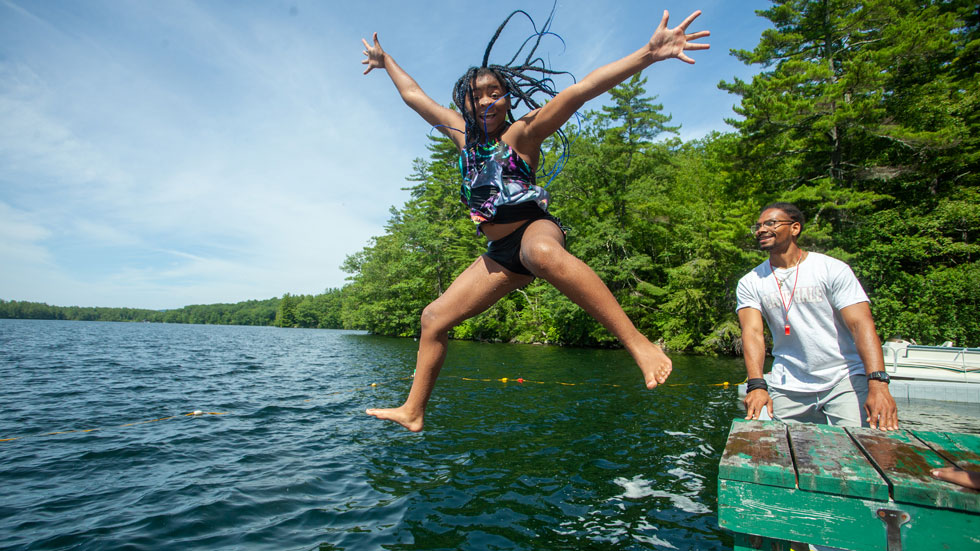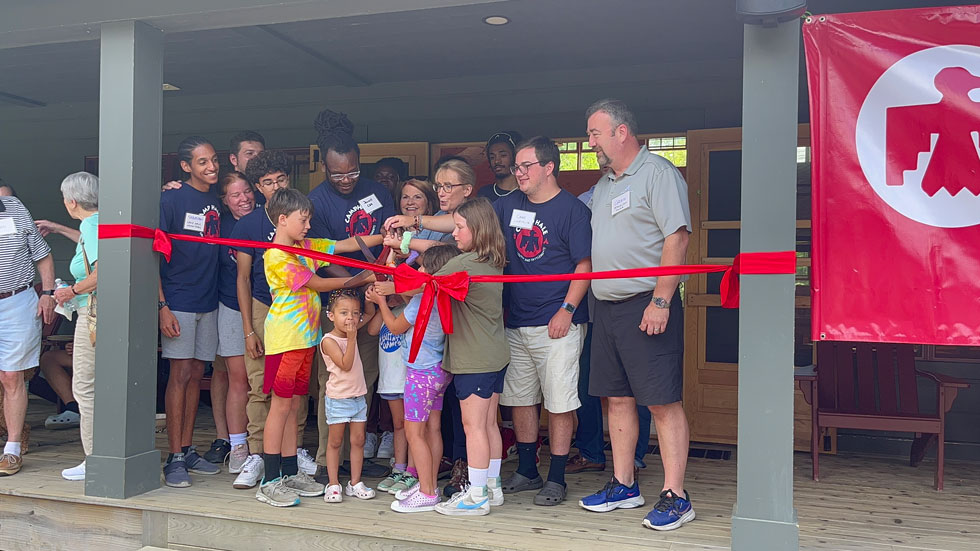American Tower Corp.’s (NYSE: AMT) work to support digitally underserved communities took a new direction this summer when the REIT and its Boston-based nonprofit partner United South End Settlements (USES) launched the first U.S.-based Digital Community at a remote New Hampshire sleepaway camp.
Launched in 2012, American Tower’s Digital Communities program creates digitally connected spaces equipped with information and communication technology, providing digital literacy and youth education instruction, financial literacy and career skills development, as well as access to healthcare services.
This July, Camp Hale, which is run by USES, once again welcomed Boston-area youth to its pristine 26-acre campus on Squam Lake, south of New Hampshire’s White Mountains. The sleepaway camp provides urban-living children access to the outdoors and gives participants the opportunity to explore nature and foster leadership skills. This year, Camp Hale also promised a host of new activities focused on digital literacy and greater connectivity with the surrounding world thanks to the launch of its digitally connected campus.
“With technology we’ve actually been able to enhance the exposure to the outdoors and amplify the learning opportunities for our children,” USES President and CEO Jerrell Cox says. While the camp is designed to allow children to largely disconnect from the screens of daily life and commune with the environment, Camp Hale now uses access to the internet and digital tools to complement the camp’s nature exploration program.
Campers can now help categorize wildlife and animals, identify invasive species, and utilize astronomy programs. For the first time ever, the children produced a podcast showcasing their voices and perspectives on current events and ways to help one another through the challenges of adolescence. The connected campus also created more reliable communication for counselors to act quickly in cases of injury or emergency, as well as a way of checking in with family back home—something previously impossible with the lack of cell and internet reception.
Collaboration started during pandemic
First launched in 1900, Camp Hale serves roughly 225 children, ages six to 15, with the goal of increasing their “sense of well-being, social skills, and awareness of personal potential.”
The launch of the Digital Community at Camp Hale marked an ongoing collaboration between USES and American Tower that first began during the COVID-19 pandemic.
“We knew we needed to find the people who were falling between the cracks during the pandemic and give them extra support,” says Becca Gould, American Tower’s senior vice president of public affairs. Gould said they didn’t have to look far and found USES in their own neighborhood in the Back Bay/South End area of Boston. “They were servicing children and families throughout the challenges of the pandemic so we wanted to help in whatever way we could.”
USES opened its doors in 1892 originally as the Andover House, the first settlement house in Boston. Like other settlement houses in the U.S. and UK of this era, its goal was to aid impoverished neighborhoods out of poverty by providing resources, opportunities, and community. After World War II, the five area settlement houses united to accommodate city changes and dwindling resources in the South End neighborhood.
During its 130 years, USES has developed new ways to help support whole families in achieving economic mobility. Its programming includes early childhood education, an after-school program called club48, Camp Hale, coaching to help parents pursue career goals and beyond, and its Striving Towards Economic Prosperity Program (STEP)—a guaranteed income program providing $800 of unrestricted monthly payments to alleviate financial stressors and barriers to overcoming poverty.
The partnership between American Tower and USES started with something as simple as headphones. The pandemic had thrust children and families into remote learning, leaving USES scrambling to address the needs of its childcare and educational programming. “We needed headphones and screen devices. We realized we didn't have the resources to access these items quickly,” Cox says.
American Tower immediately saw an opportunity to step in. According to Cox, they dropped off the needed headphones and launched an ongoing conversation about how the REIT could help USES continue and grow its mission. The partnership grew from there.
“USES is a trusted organization that’s really trying to end the cycle of poverty,” says Kirsten Young, American Tower’s director of sustainability programs. The two organizations came together to figure out how best to collaborate. “It was really important that we listened to the strengths and needs of one another,” she explains.
American Tower “had an expertise with digital communication and connectivity and creating this digital community concept internationally,” Cox adds, “while our expertise is in this community.”
Hearing that USES’ Camp Hale was in dire need of better connectivity for the safety of counselors and campers in the remote area of New Hampshire—especially after a COVID-19 outbreak at camp the previous summer— American Tower saw the opportunity to launch its first U.S. Digital Community to better facilitate the camp’s organizational needs. It also provided the chance to enhance the programming through high-speed internet in a thoughtful way, without undermining the camp’s natural surroundings and seclusion.
Making impactful changes
Young says forming Digital Communities is no easy undertaking. “It's challenging to bring together multiple stakeholders, corporations, governments, nonprofits, and communities in order to create digital equity,” she says. “But it's also motivating because you can really make impactful changes.” American Tower’s goal is to launch 2,000 digital communities, and it has already created more than 445 of them globally from Mexico and Argentina to Nigeria and Kenya.
Camp Hale’s location added its own obstacles. “It's a rural area, and those are classically the under connected in the U.S.,” Young says. “They're very difficult to wire so we had to work with New Hampshire Broadband, Sen. Maggie Hassan (D-NH), and Gov. Christopher Sununu to get the last mile of fiber optic laid to the camp so that they could have Wi-Fi,” added Gould.
For Cox, Camp Hale’s evolution brings his experience and connection to the organization full circle. “I love Camp Hale. It inspired a pathway of leadership, career development, and now I have the opportunity to serve as the leader of this organization.” He and his brothers were first introduced to USES as campers in 1994.
Over the course of his 30-year relationship with the nonprofit, Cox has worked in every facet of the organization from its after-school program club48, to serving as Camp Hale’s director, then as vice president of development and external relations, and finally, now as CEO.
“What's kept me [here] is service to the community and meaningful relationships with partners like American Tower,” Cox says. “Now I get to see kids boost their own self-expression and creativity and help families end the cycle of poverty.

